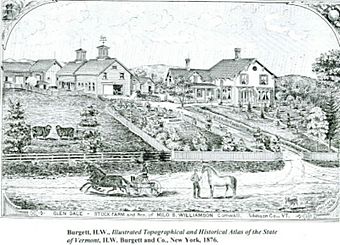Glen Dale Farm facts for kids
Quick facts for kids |
|
|
Glen Dale
|
|

Burgett lithograph of Glen Dale Farm in 1876
|
|
| Location | 1455 Cider Mill Rd., Cornwall, Vermont |
|---|---|
| Area | 3.5 acres (1.4 ha) |
| Built | 1780 |
| Architectural style | Italianate, English barn |
| MPS | Agricultural Resources of Vermont MPS |
| NRHP reference No. | 02000776 |
| Added to NRHP | July 11, 2002 |
Glen Dale Farm is a historic farm in Cornwall, Vermont. It's located at 1455 Cider Mill Road. This special farm is about 3.5 acres big and has five important buildings. In 2002, it was added to the National Register of Historic Places. People have been farming here since the 1770s! In the late 1800s, Glen Dale Farm became famous. It was one of the best places in the country to breed Merino sheep.
Contents
What Makes Glen Dale Farm Special?
Glen Dale Farm has some really old and interesting buildings. The most important one is the English barn.
The English Barn
The English barn is very old. It was likely built around 1775. This type of barn was one of the first major farm buildings in Vermont. It has a strong frame made from hand-cut hardwood timbers. The wooden beams are joined together in a special way called "half dovetail tenons." The inside walls still have their original wooden boards. These boards are very wide, up to 2 feet across! They were fastened with old, hand-made nails.
Back in the 1700s, this barn was used for everything. It stored grain and hay. It also sheltered farm animals. The way it was built shows us a lot about local history from that time.
Farmhouse and Other Barns
Glen Dale Farm looks much like it did in the late 1800s. This was when Milo B. Williamson owned it. He was famous for breeding Merino sheep and special horses. The main farmhouse is built in the Italianate style. You can see the farmhouse and other barns in an old picture from 1876. This picture is from Burgett's Illustrated and Topographical Atlas of the State of Vermont.
The farm's barns are still in great shape. They look very similar to the old picture. This makes Glen Dale Farm one of the best examples of a 19th-century sheep and livestock farm in Vermont.
The English barn is the second barn from the left in the old picture. The two bigger barns in front were built for horses and carriages. These barns have cool features like ventilated cupolas (small towers on the roof) and decorative trim. These were common on Vermont barns in the 1870s and 1880s. The barn at the very back is the sheep barn. It's one of the few sheep barns left in Vermont that hasn't been changed much.
Who Owned Glen Dale Farm?
Milo B. Williamson was a very important owner of Glen Dale Farm. He was a big name in the Vermont Merino Sheep Breeders' Association. He helped lead the group for many years. He was the treasurer from 1879 to 1881. Then he became president from 1882 to 1883.
Mr. Williamson worked with Jerome P. Cherbino. Together, they bred Spanish Merino sheep. This was during a time when Addison County was a world leader in sheep breeding!
Glen Dale Farm's History
The land where Glen Dale Farm sits has a long history. Solomon Linsley first settled here in 1774. The town of Cornwall itself got its official permission (or "charter") in 1761. Solomon Linsley was one of the first settlers whose name was on that original charter.
In 1774, a man named Gamaliel Painter measured out 100 acres for Solomon Linsley. Even though the very first farmhouse isn't there anymore, Solomon Linsley probably built the English barn around 1775.
Glen Dale Farm is a well-known place in Cornwall. An old map from 1871 shows how important M.B. Williamson's property was on Cider Mill Road. Experts say that Glen Dale Farm should be protected. It's like a valuable history book that shows what farm life was like after the Civil War in Vermont.
People have worked hard to keep the barns strong. The Vermont Division for Historic Preservation has even helped. The Glen Dale barns are listed on the Vermont State Register of Historic Places. The farm is also mentioned in a book about Addison County's historic buildings. It's described as one of the best "model stock farms" in Cornwall during the late 1800s.
In July 2002, Glen Dale Farm was officially added to the National Register of Historic Places.



